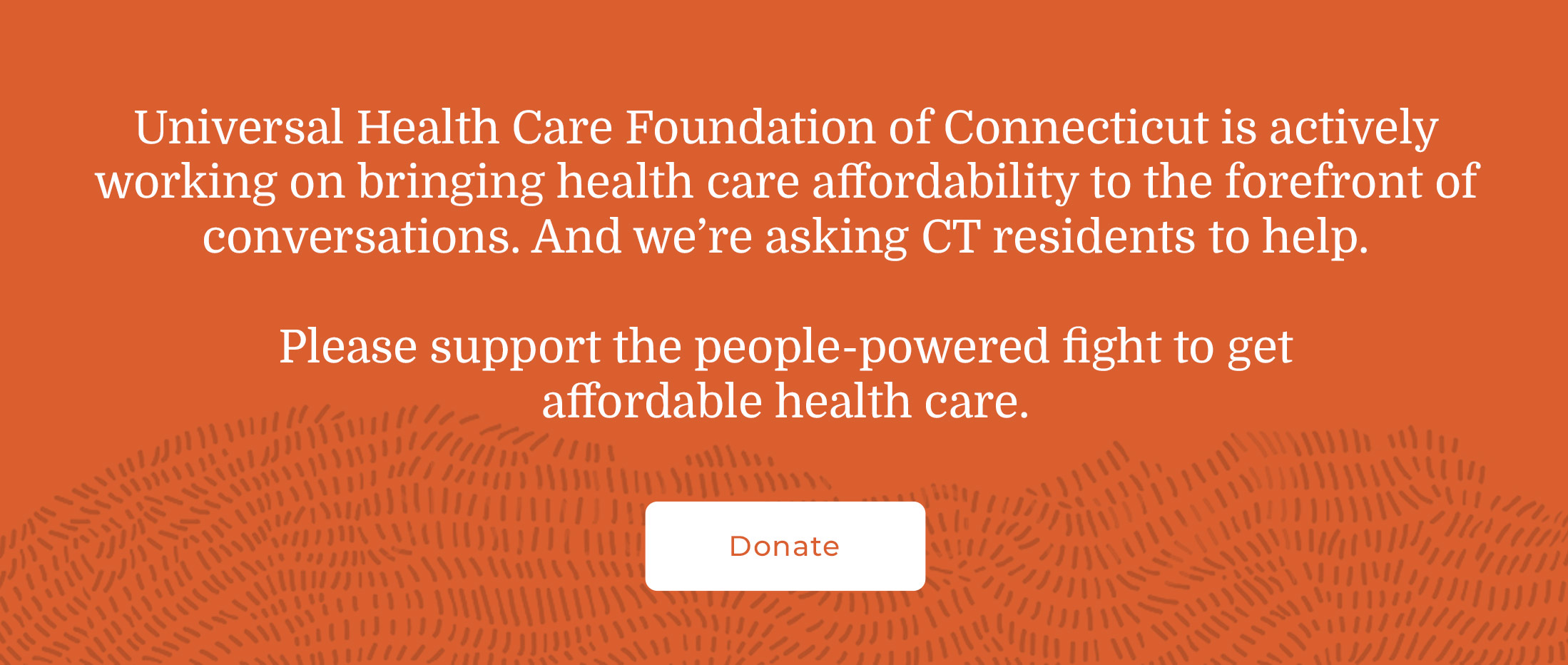Survey Shows Voters Need & Want Action on Health Care
Results from a new survey indicate that Connecticut residents face multiple barriers to affordable, quality care; with people of color, low- and moderate-income households, and people living with a disability hit hardest.
This is the third time a version of this survey was conducted in Connecticut (the last one was May 2020), and the first time race, ethnicity and disability data were collected, enabling a deeper understanding of health care disparities.
The survey also shows that state residents overwhelmingly support government action to address affordability challenges, with widespread agreement across party lines.
Conducted by the national nonpartisan Altarum Healthcare Value Hub, the Consumer Healthcare Experience State Survey (CHESS) findings are summarized in two policy briefs released last week. (Links to the briefs are included below.)
Affordability challenges worse by race, ethnicity, income & disability
The survey found that 78% of Connecticut respondents worry about affording health care now or in the future and 33% experienced one or more struggles to pay their medical bills.
When looking at affordability challenges by race and ethnicity, 69% of Black respondents reported one or more affordability problems in the past year – a much higher rate than reported by white respondents (48%). Other differences by race and ethnicity in missing out on care due to cost included:
|
|
Asian/Native American/Pacific Islander |
Black |
White |
|
Problems getting mental health care |
24% |
23% |
11% |
|
Rationed medication |
37% |
33% |
19% |
|
|
Hispanic/Latinx |
Non-Hispanic/ Latinx |
|
Problems getting mental health care |
24% |
11% |
|
Rationed medication |
30% |
21% |
Disparities are when looking at households including a person with at least one disability:
|
|
Household includes a person with at least one disability |
Household that does not include a person with a disability |
|
Problems getting mental health care |
27% |
9% |
|
Rationed medication |
40% |
16% |
Income also really matters when it comes to health care affordability with both low- and moderate-income residents reporting much greater challenges than households above $75,000.
|
|
Less than $50k |
$50k-$75k |
$75k-$100k |
More than $100k |
|
Rationed medication |
28% |
26% |
15% |
19% |
|
Delayed/went without care |
57% |
52% |
43% |
37% |
|
Incurred medical debt, depleted savings and/or sacrificed basic needs due to medical bills |
42% |
46% |
27% |
24% |
Care disparities based on mistrust and disrespect
One of the most disturbing findings is the level of mistrust and disrespect experienced by Connecticut residents in an encounter with a health care provider (38%), with widespread disparities reported by race and ethnicity as well as disability status.
These negative experiences have consequences, with 21% reporting they went without needed care, although that percentage was much higher in some groups than others.
|
|
Distrusted or Felt Disrespected by a Health Care Provider |
Went Without Needed Care Due to Distrust of/Disrespect by a Health Care Provider |
|
Asian/Native American/Pacific Islander |
59% |
44% |
|
Black |
60% |
36% |
|
White |
29% |
14% |
|
|
|
|
|
Non-Hispanic/Latinx |
33% |
18% |
|
Hispanic/Latinx |
55% |
34% |
|
|
|
|
|
Household includes a person with at least one disability |
59% |
39% |
|
Household that does not include a person with a disability |
30% |
15% |
People want their government to act
A full 70% of respondents agree or strongly agree that the U.S. health care system needs to change. When asked about specific policies, some of the strongest support, across party lines, was for action to curb high prescription drug prices and to expand health insurance options so that everyone can afford quality coverage. (See Table 6 of Data Brief 133, Connecticut Residents Struggle to Afford High Healthcare Costs)
This survey is one tool to make sure the voices of Connecticut residents are heard. Too often action is thwarted when it runs headlong into the power of the insurance, hospital, and prescription drug industries. The message from the survey is loud and clear: Connecticut residents are relying on policymakers to take bold action on their behalf.
Resources
Data Brief 133: Connecticut Residents Struggle to Afford High Healthcare Costs; Worry about Affording Healthcare in the Future; Support Government Action across Party Lines
Learn More
Data Brief 134: Connecticut Residents Bear Healthcare Affordability Burdens Unequally; Distrust of/Disrespect by Healthcare Providers Leads Some to Delay/Go Without Needed Care
Learn More
Data briefs from the previous surveys conducted in 2020 and 2018 can be found on the Healthcare Value Hub website.
Another important measure of affordability is the Connecticut Healthcare Affordability Index (CHAI), which Universal helped to create, along with Connecticut Health Foundation, the Office of Health Strategy and the Office of the State Comptroller. To learn more about CHAI, see this explainer on our website
An important effort is currently underway at the state level to understand health care cost drivers and to recommend policy changes. This effort, the Healthcare Benchmark Initiative, is currently debating policy options that impact both prescription drug and hospital costs. The Steering Committee is currently meeting monthly and agendas, minutes and presentations can be found on the Office of Health Strategy website.

